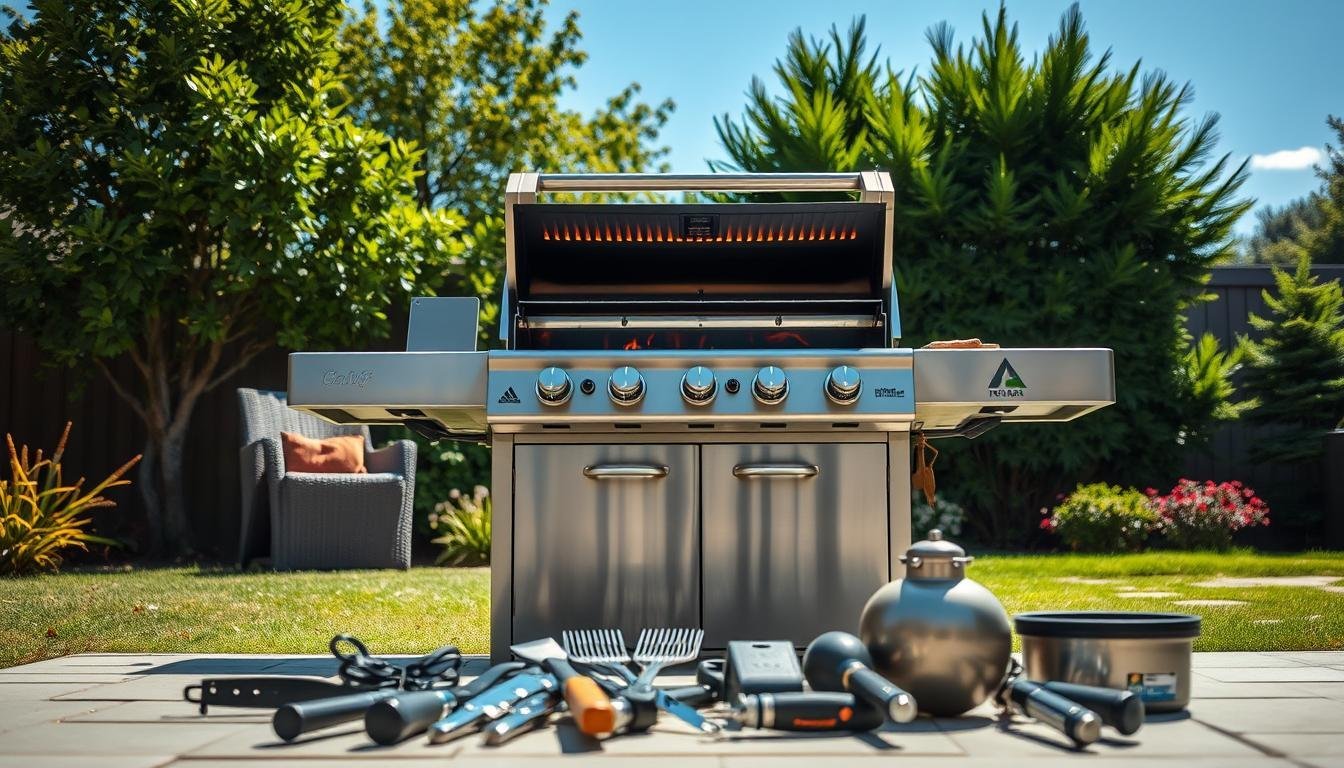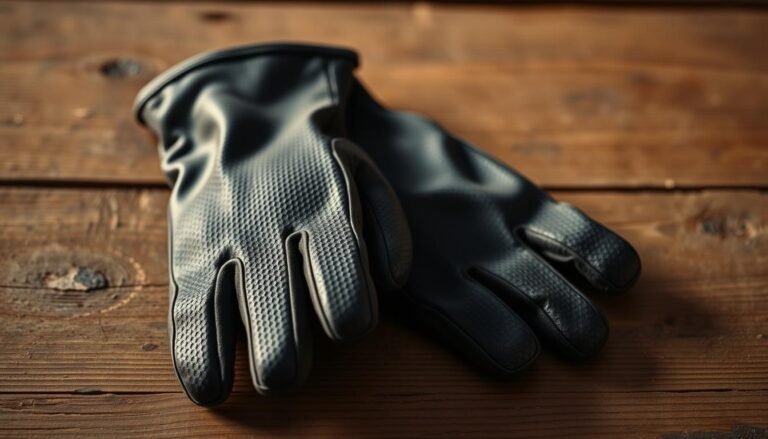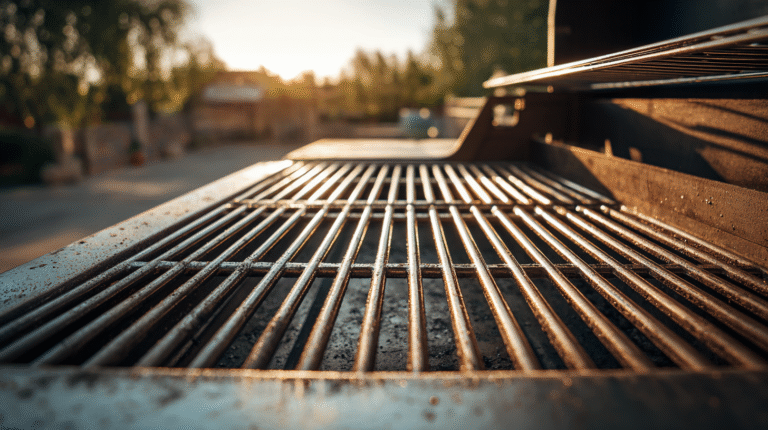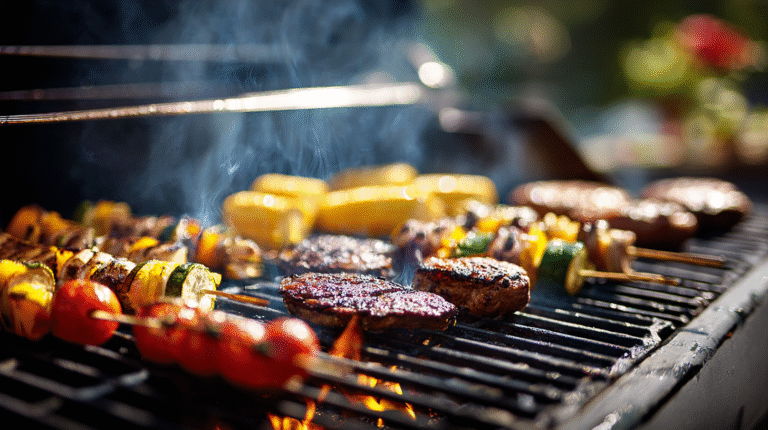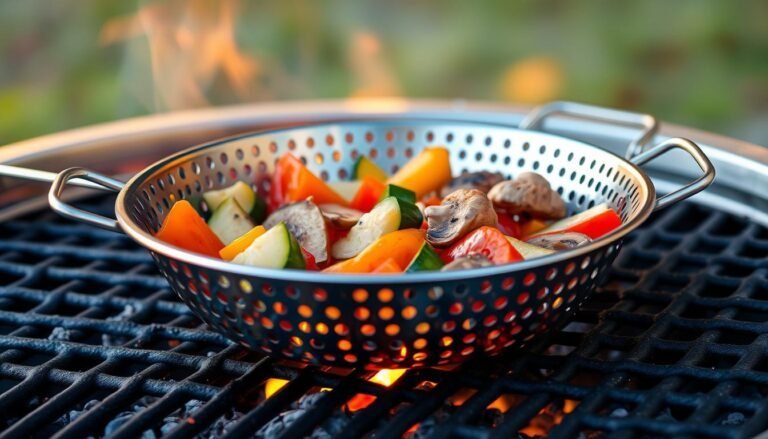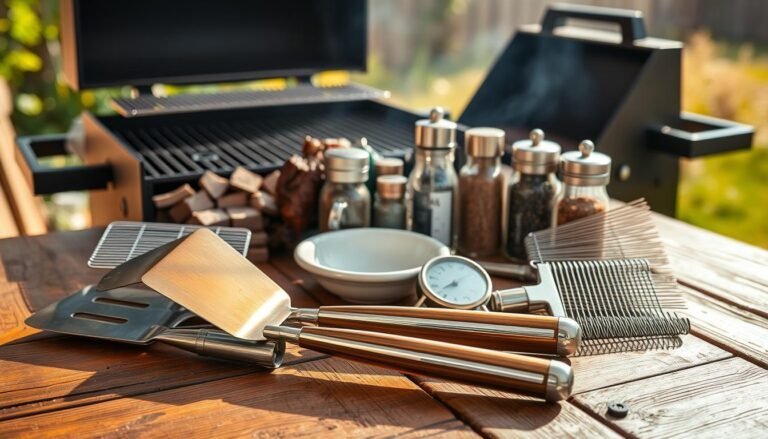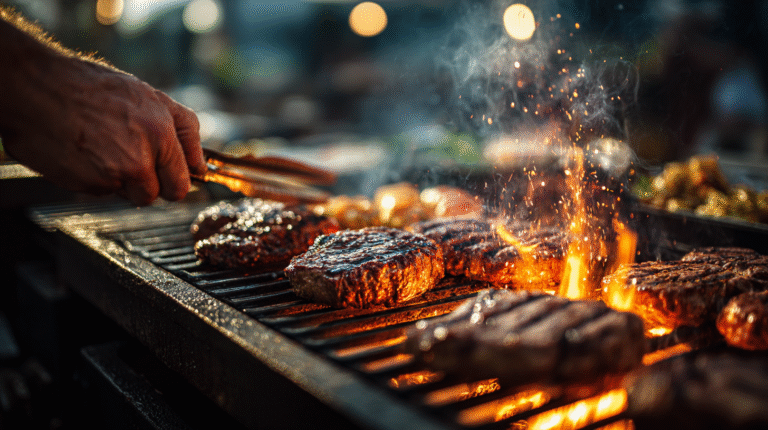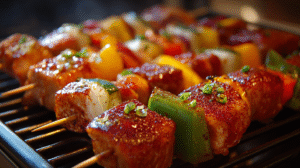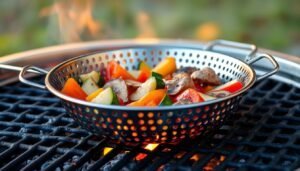Disclosure: This Post Contains Affiliate Links; We earn a commission on purchases.
Choosing the right BBQ grill for outdoor cooking can be tough. Many people struggle between charcoal and gas grills. Serious Eats says, “60% of households choose gas grills.” But, it really comes down to what you like, how you cook, and how much work you want to do.
Choosing between charcoal and gas grills means thinking about a few things. You need to decide what kind of cooking you want, how much work you’re willing to do, and what flavor you like.
Key Takeaways
- Understand the differences between charcoal and gas grills.
- Consider your personal cooking style and preferences.
- Evaluate the maintenance requirements of each grill type.
- Think about the flavor profile you want to achieve.
- Assess your budget and available space.
The Fundamentals of Backyard Grilling
Backyard grilling is a big part of outdoor cooking. It gives a special way to cook food. Knowing the basics of grilling is key to cooking perfectly.
The Evolution of Outdoor Cooking
Outdoor cooking has a long history. Grilling is a favorite way to cook many foods. Today, we have many grilling options, from charcoal to gas grills.
Taste of Home says some people love charcoal grills. They like the smoky taste they give food.
Why Your Grill Choice Matters
The grill you pick changes your grilling experience. Charcoal grills give a unique taste. Gas grills are easy to use and convenient.
Choosing the right grill depends on what you like and need.
Assessing Your Grilling Needs
Think about how often you grill and what you cook. Also, consider the space for your grill. This helps you pick between charcoal or gas.
Understanding Grill Types: Charcoal vs. Gas
Knowing the difference between charcoal and gas grills is key for great BBQ. Each type has its own good points and downsides.
How Charcoal Grills Work
Charcoal grills burn charcoal to heat up. You light the charcoal, and it burns to cook your food. They get very hot, perfect for searing meat.
It takes about 30 minutes for charcoal grills to get ready, says The Home Depot. The smoky taste comes from burning charcoal.
How Gas Grills Function
Gas grills use propane or natural gas for heat. They light the gas to make a flame, which you adjust for temperature. They heat up fast, in about 10 minutes, The Home Depot says.
They’re easy to use and control the heat well. This makes them good for many dishes.
Key Structural Differences
Charcoal and gas grills look different. Charcoal grills have a firebox for burning charcoal. Gas grills have metal burners.
For more on the differences, check out this article that goes into detail.
Some main differences are:
- Heat Source: Charcoal grills use charcoal, while gas grills use propane or natural gas.
- Heat-up Time: Gas grills heat up faster than charcoal grills.
- Temperature Control: Gas grills offer more precise temperature control.
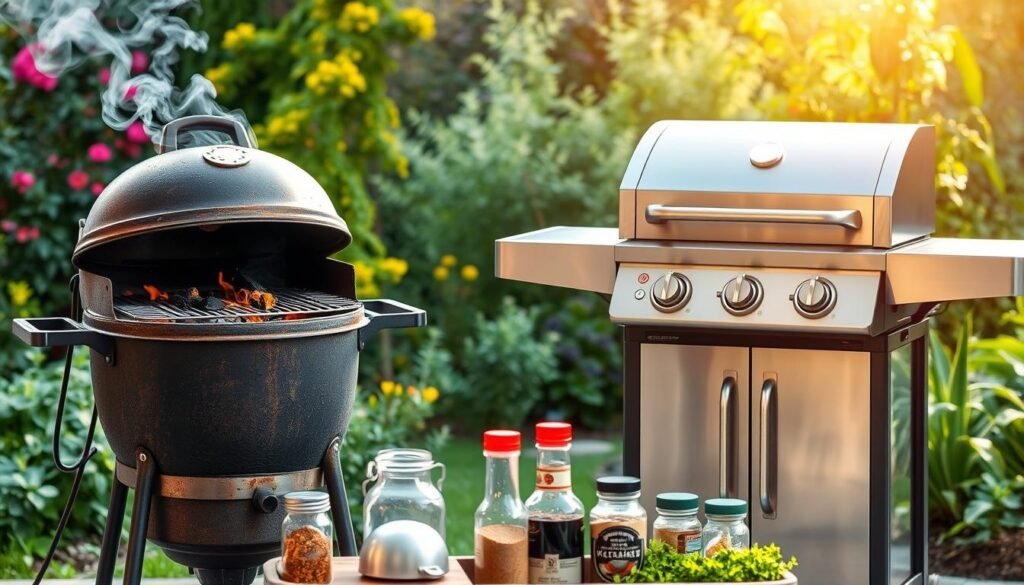
Flavor Profile and Cooking Performance
It’s important to know the differences between charcoal and gas grills. The type you choose can change how your food tastes. This affects the quality of your grilled dishes.
The Distinctive Smoky Flavor of Charcoal
Charcoal grills give food a rich, smoky taste. This comes from burning charcoal and the Maillard reaction when food cooks at high heat.
The Clean Taste of Gas Grilling
Gas grills, on the other hand, offer a cleaner taste. They let the food’s natural flavors stand out. This is great for those who like a lighter, less smoky flavor.
Temperature Range and Heat Distribution
Charcoal and gas grills have different temperature ranges and heat distribution. Charcoal grills can get very hot but the heat isn’t always even. This requires skill to manage.
Gas grills, though, have precise temperature control and even heat. This makes them easier to use for consistent results.
When picking between charcoal and gas grills, think about what you want. Do you like the smoky taste of charcoal or the clean taste of gas? The right grill can make your grilling better.
Practical Considerations When Choosing a Grill (Charcoal or Gas)
When deciding between charcoal and gas grills, think about a few key things. The best grill for you depends on your outdoor cooking needs. Consider these practical points.
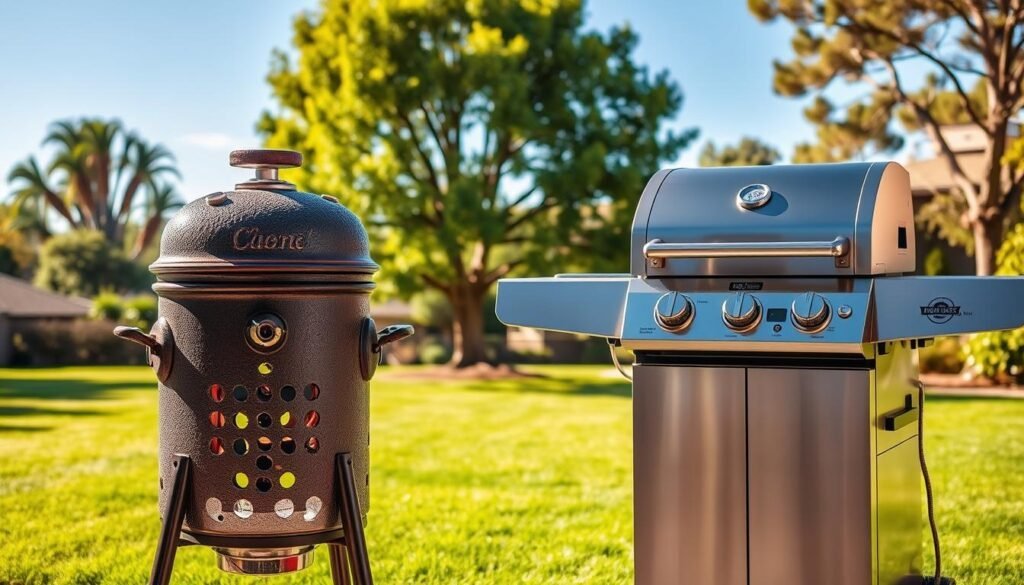
Initial Cost and Long-term Investment
Charcoal grills are often cheaper to buy than gas grills, says Taste of Home. But, buying charcoal or wood can cost more over time. Gas grills are pricier at first but save money in the long run, great for those who grill a lot.
Convenience and Ease of Use
Gas grills are easier to use than charcoal ones. They heat up fast and let you control the temperature well. Cleaning them is also simpler. Charcoal grills take longer to get hot and harder to keep at the right temperature.
Space Requirements and Portability
Gas grills need more space and are harder to move than charcoal ones. Charcoal grills come in all sizes, perfect for small spaces or camping. Think about how much room you have and if you need to move the grill around.
Weather and Seasonal Considerations
Weather affects your grilling. Charcoal grills lose heat in windy or cold weather. Gas grills, being enclosed, are better for all seasons.
Environmental Impact
Think about the environment when choosing a grill. Charcoal grills make more pollution and waste, like ash and packaging. Gas grills, though they also pollute, are better for the planet. This is true if you refill or recycle your propane tank.
Maintenance and Accessories for Your Grill
Keeping your grill in good shape makes grilling better. It helps your grill work well, whether it’s charcoal or gas. Taking care of it also makes your food taste better and keeps you safe.
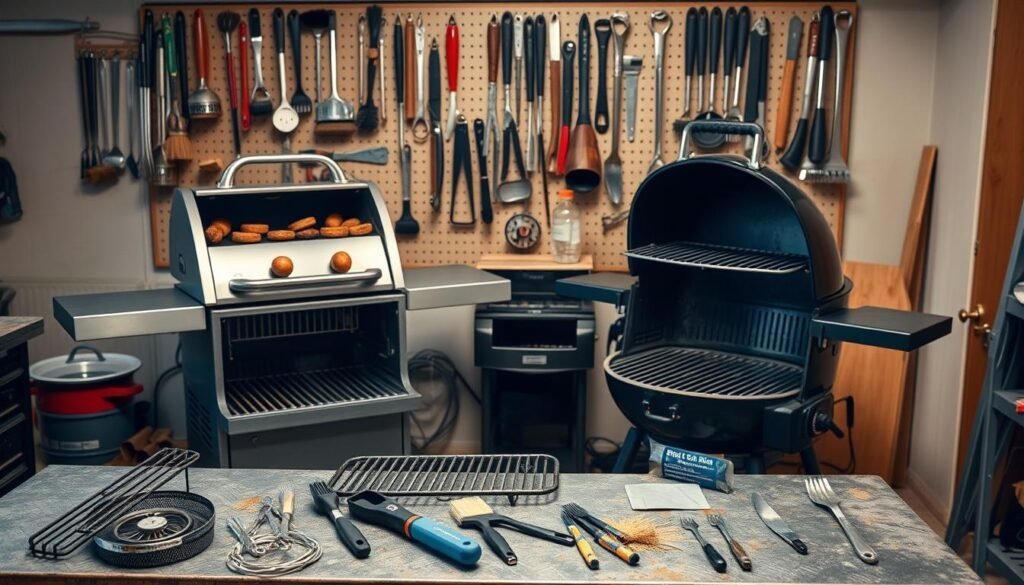
Cleaning and Maintaining Charcoal Grills
Charcoal grills need cleaning often to get rid of ash and food bits. Clean the grates after each use. Also, check for parts that need to be replaced.
Using a brush and making sure vents are open helps a lot. It makes your grill work better.
Gas Grill Upkeep and Safety Checks
Gas grills need safety checks often. Look for gas leaks, clean burners, and check the igniter. Cleaning grates and drip pans stops flare-ups and keeps the grill efficient.
Essential Accessories for Better Grilling
Getting the right tools makes grilling better. You’ll need a thermometer for the right heat, gloves for safety, and a brush for cleaning. The Home Depot has many accessories to help, like baskets and smoker boxes.
By following these tips and using the right tools, your grill will stay in great shape. You’ll enjoy delicious meals for many years.
Conclusion: Making Your Final Decision
Choosing between charcoal and gas grills depends on what you like and how you cook. Think about temperature range, setup time, and cost. This helps you pick the right outdoor cooking gear for you.
Gas grills are easy to set up and work fast. They heat up from 225°F to 600°F. This makes them great for those who want quick results.
Charcoal grills give a smoky taste and can get very hot. They’re perfect for BBQ that needs a crispy outside and soft inside.
When picking the best grill, think about your budget, space, and cooking habits. Weighing these points helps you find a grill that makes your outdoor cooking better. It also helps you get the BBQ just right.
FAQ
What are the main differences between charcoal and gas grills?
Which type of grill is more convenient to use?
How do I maintain my charcoal grill?
What are the benefits of using a gas grill?
Can I achieve a smoky flavor with a gas grill?
How do I choose the right grill size for my needs?
What are some essential accessories for grilling?
How often should I clean my gas grill?
Can I use a charcoal grill in cold weather?
What are some safety tips for grilling?

From quick grilling techniques to simple gear advice, Ryan helps beginners and busy home cooks fire up great meals without over-complicating it. Whether you’re using charcoal, gas, or a portable grill, Ryan’s goal is to make grilling approachable, fun, and full of flavor.
Subscribe to Our Newsletter

